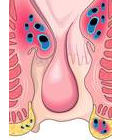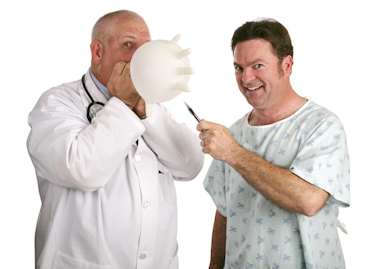Prolapsed Hemorrhoid Treatment
Just as you were beginning to wrap your thoughts around and come to terms with the fact that you have hemorrhoids here comes the realization that your hemorrhoids have prolapsed. Say what? Prolapsed hemorrhoids is simply a fancy way of referring to internal hemorrhoids that have become so enlarged that they have no choice but to drop or protrude outside of your rectal canal. Quite different from external hemorrhoids which have their origins from the outside the prolapsed hemorrhoids start from the inside and protrude out. In the following paragraphs we will explore some options for treatment of prolapsing internal hemorrhoid.
Causes and Prevention of Prolapsed Hemorrhoids
 Anything that leads to the strain of the vessels in the rectal area can result in the formation of hemorrhoids. Strain can be brought on by constipation or diarrhea, strenuous activities, pregnancy and even old age. Another factor that must be considered as a probable cause of hemorrhoid is obesity. An obese person has extra fat that can add extra pressure on the rectal veins, reduce muscle tone and result in bad posture which will put stress on the rectal veins.
Anything that leads to the strain of the vessels in the rectal area can result in the formation of hemorrhoids. Strain can be brought on by constipation or diarrhea, strenuous activities, pregnancy and even old age. Another factor that must be considered as a probable cause of hemorrhoid is obesity. An obese person has extra fat that can add extra pressure on the rectal veins, reduce muscle tone and result in bad posture which will put stress on the rectal veins.
Hemorrhoids in general including prolapsing internal hemorrhoids can be prevented by increasing your daily fluid intake which will maintain proper and regular bowel movement. Include vegetables, fruits and lots of whole grain, which are all good sources of fiber, in your diet in other to keep the stools soft and free flowing. Develop a habit of taking walks daily since even moderate exercise will go a long way in increasing muscle tone and healthy veins that are not easily strained.
Symptoms of Prolapsed Hemorrhoids
You can identify and easily distinguish your prolapsed hemorrhoids from external hemorrhoids by the fact that the prolapsed hemorrhoid will protrude from the inside of the rectum, is usually wet and covered with mucus from the rectum and can cause bleeding with the passage of stools. Although prolapsed hemorrhoids are usually painless there are cases where the external mass of tissue can be so inflamed that they cause severe pain.
Degrees of Prolapsed Hemorrhoids
To further complicate things, or perhaps just to classify prolapsed hemorrhoids in the medical field, there are three degrees of prolapsed hemorrhoids. They are grades II, III and IV. If your hemorrhoids have reached a prolapsed stage they are classified as either grade III or grade IV. In the third stage the tissue can be placed back manually within the anal canal but in the fourth stage it cannot be reinserted and will continuously hang outside the anus. The second degree is not as severe and in this case is rarely observed since it will only emerge from the rectum with the passage of stools but will retract almost immediately afterward.
Prolapsed Hemorrhoid Treatment
The treatment of prolapsing internal hemorrhoid all depends on their severity. Warm water baths can help the discomfort and pain associated with inflammation and ointments and creams can relieve itching and swelling.
In more severe cases (grade IV prolapsed hemorrhoids) a Hemorroidectomy might be recommended which involves the surgical removal of the hemorrhoid. This procedure requires some time for recovery and there will be excessive pain following the procedure.
A Stapled Hemorrhoidectomy is another option which works by reducing the flow of blood to the inflamed tissue and so the hemorrhoid is starved from a supply of blood. Since it is much less painful than Hemorrhoidectomy and requires much less time for recovery it is the prolapsed hemorrhoid treatment most preferred by both doctors and patients.
Categories: Hemorrhoids information, Hemorrhoids Treatment Tags: internal hemorrhoids, prolapsed hemorrhoids
What Doctor Treats Hemorrhoids
If you’re silently suffering the pain of hemorrhoids thinking that no one understands your pain, think again! The fact that “hemorrhoid cure” and its various misspellings and other associated phrases such as “treat hemorrhoid from home” are searched for on Google more than 12 million times monthly says quite a lot about this common disorder. If you use this fact to make the assumption that people like you, and me, would rather just cure hemorrhoids at home then you’d be quite correct. Natural hemorrhoid treatment methods are most of the time hemorrhoids sufferer’s best friend. Most sufferers will find one right solution that would cure the problem for good all without the embarrassment of explaining every detail to your doctor.
 There comes a time though when you have to bite the bullet and get yourself checked out by someone who knows more about hemorrhoids than most of internet hemorrhoid guides. Your question would then be “what doctor treats hemorrhoids?” Before I pose the somewhat complicated answer to that question though let me first tell you when you need to consider seeing your doctor about your hemorrhoids.
There comes a time though when you have to bite the bullet and get yourself checked out by someone who knows more about hemorrhoids than most of internet hemorrhoid guides. Your question would then be “what doctor treats hemorrhoids?” Before I pose the somewhat complicated answer to that question though let me first tell you when you need to consider seeing your doctor about your hemorrhoids.
When your slight discomfort, swelling and minimal rectal bleeding becomes moderate or severe pain and heavy bleeding that lasts more than one week, or that small lump seems to have a life of its own and when internal tissue bulge from the anus then it is time to pick up the phone and call your doctor. Better yet get in your car and head straight to the emergency room. The time for home treatments and watchful waiting is over.
What Doctor Treats Hemorrhoids? Who Do You Call?
The General Physician
You’ll be happy to find out that your general physician should be your first stop. Explain your symptoms to him and after an examination he most likely will prescribe some medication, recommend some dietary changes, suggest sitz baths and pat you on your hand while giving you a reminder to return for a follow up visit.
If your symptoms are really severe and if your general physician suspects something more serious is in the works he would then refer you to a proctologist.
 The Proctologist
The Proctologist
A proctologist is a doctor who specializes in diseases of the rectum and anus. The proctologist will examine the area and look for any potential problems and will make the examination of hemorrhoid symptoms as painless as possible both physically and psychologically.
Once the examination is complete the proctologist will either prescribe medication, natural remedies or he might refer you to a colorectal surgeon for surgery. If he suspects that there are intestinal complications that go beyond the visible hemorrhoids he will refer you to a gastroenterologist.
The Gastroenterologist
Always be prepared for the possibility that your problem could be more than hemorrhoids. If your proctologist feels that the intervention of a gastroenterologist is required then he will step in and perform several examinations to determine the root of the problem. If your complications do not go deeper than your lower intestinal tract then the proctologist will refer you directly to a surgeon.
The Colorectal Surgeon
The sole purpose of the colorectal surgeon is to perform the surgical procedure on your colorectal region that will get rid of your hemorrhoids once and for all. Once the procedure is completed he will refer you back to the proctologist for post surgical care.
The simple answer to the question what doctor treats hemorrhoids, is that it all depends on the severity of the hemorrhoids itself. From general practitioners to proctologists, gastroenterologists and colorectal surgeons they all have a part to play in helping you cure hemorrhoids.
Categories: Hemorrhoids Treatment Tags: hemorrhoids doctor, hemorrhoids removal, hemorrhoids treatment
